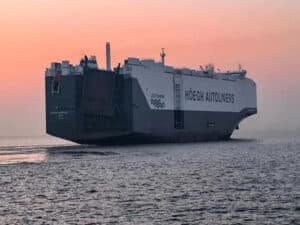
BWMS breakthrough: Ecochlor launches new no-filter EcoOne
Written by Nick Blenkey
Ecochlor CEO Steve Candido. “Our newest BWMSs offer more options to shipowners, allowing them to make informed decisions for the BWMS requirements for each of their vessels."
North Haven, Conn., headquartered ballast water management system specialist Ecochlor has launched a new system, EcoOne, that promises to deliver major benefits by eliminating the need for the filter generally used with UV or electro-chlorination ballast water treatment systems.

“By eliminating the filter, we have taken simplicity and reliability in ballasting operations to the maximum level,” says Ecochlor’s vice president of business development, Andrew Marshall, who says that the ClO2 treatment technology has been tested extensively to ensure that it works effectively as a single pass treatment under all operating conditions with no neutralization or retreatment. prior to discharge.
“Plus,” he adds, “there are no problematic TRO (Total Residual Oxidant) sensors, electrodes or complex power supplies in either the new EcoOne systems or the Ecochlor BWMS.”
PATENTED SYSTEM
The key difference between Ecochlor systems and others is that its patented technology is based on the use of chlorine dioxide (ClO2), rather than chlorine, for the elimination of aquatic invasive species in ballast water.
ClO2 is a powerful biocide, used in land-based treatment applications, including drinking water, for over 70 years. While chlorine (bleach) and ClO2 are both oxidizing agents, they work in fundamentally different ways. ClO2 reacts with living cells by first penetrating the bacterial cell wall and then reacting with the material within the living cell in order to kill the organism.
On the other hand, chlorine reacts with almost any organic material (living and non-living) such as oil, algae, sediments, etc. This means that waters with high levels of organic matter can increase the demand for chlorine, leaving less of the chemical available to treat living organisms; thus, requiring an increase in dose. Due to the types of reactions that chlorine has with both organic and inorganic compounds, chlorine has a greater potential to form undesirable by-products in water.
ClO2 disinfectant particularly well-suited as a filterless BWMS option since it is not affected by suspended sediments or turbidity. This means that ClO2 disinfection is effective regardless of changes in turbidity. Filtration is not necessary to remove sediments prior to treatment with ClO2, in contrast with UV or similar technologies.
THREE OPTIONS
With the introduction of EcoOne, Ecochlor now offers three different BWMS options, all using the same core, ClO2 technology. Within all Ecochlor Systems, ClO2 is generated on demand and is not stored onboard the vessel. To generate the ClO2, two precursor chemicals are pumped into a small mixing chamber, which then combines to automatically produce the ClO2. An eductor then draws the ClO2 from the mixing chamber and mixes with the motive water supply to form the ClO2 solution. This solution is injected into the main ballast water stream.When ClO2 is no longer required, the treatment system is thoroughly flushed with water to remove all residue so that it is ready for the next ballast uptake.
The three systems are:
- Ecochlor® BWMS (Filtration & ClO2): This system treats ballast water by filtering the water to 40 microns and then injecting a dose of 4.25 mg/L of ClO2. The system includes a generator cabinet, tanks, injection components, and main and aft peak tank filter(s) if required. Vessels operating this system can operate anywhere in the world with no restrictions when it comes to temperature, salinity, or turbidity.
- EcoOne BWMS (ClO2 alone): This system treats ballast water by injecting a dose of 4.6 mg/L of ClO2. The system includes a generator cabinet, tanks, and injection components. Vessels operating this system can operate anywhere in marine and brackish waters (i.e., ≥ 1PSU) and with no restrictions on temperature or turbidity.
- EcoOne Hybrid BWMS (Dual mode filtration & ClO2 or ClO2 alone): This system will allow shipowners to operate their BWMS either with or without a filter. This option will be suited for shipowners who wish to have the flexibility of unrestricted operation globally, with the convenience of a no-filter system.

The EcoOne BWMS recently completed extensive land-based testing, demonstrating compliance with the most recent, stringent USCG and IMO BWMS Code standards. Real-world shipboard testing is ongoing aboard an Aframax and a VLCC and is expected to be completed in May 2021.
“We developed the new systems in direct response to concerns expressed by shipowners about how existing ballast water treatment processes are inflexible and may not be suitable for all vessels under all circumstances,” says Ecochlor CEO Steve Candido. “Our newest BWMSs offer more options to shipowners, allowing them to make informed decisions for the BWMS requirements for each of their vessels—all without sacrificing the reliability and ’best in class’ service and support that Ecochlor is known for throughout the industry.”




